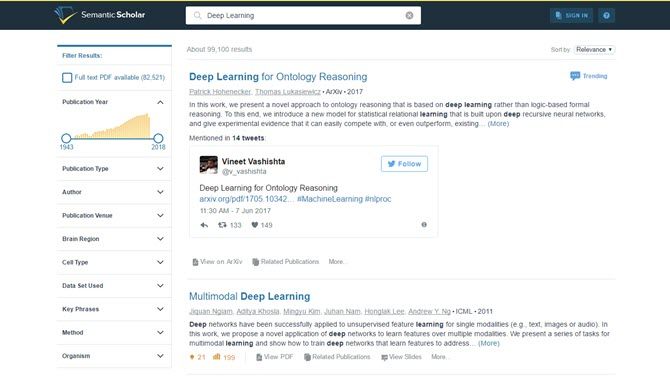An academic search engine is a must for every student or researcher, and now there's an alternative to Google Scholar: Semantic Scholar, a new academic search engine that caters to researchers.
While Google Scholar is best for deep web research, Semantic Scholar runs on a sophisticated technology that will only improve with every year it runs: artificial intelligence.
The AI-Based Search Engine
Semantic Scholar caters to neurology and computer science research for now. Microsoft co-founder Paul Allen and his non-profit Allen Institute for Artificial Intelligence are behind the development.
Google Scholar has a far broader base and more than 200 million papers in its index. The Google Search sibling uses keywords to trawl through the index created with these articles. It works like a traditional search engine that ranks sources according to relevance. The full text of each source is considered as well as the source's author, the publication of the paper, and how often it has been cited in academic literature.
Semantic Scholar uses machine learning rather than keywords to improve its "understanding" of a research paper. The search program extracts important features with the help of advanced technologies like semantic analysis, natural-language processing, and computer vision. It also goes beyond text by extracting information from images, tables, and captions.
One of the crucial tasks in academic search is to identify key citations. It is a direct indicator of the quality of a research paper. Not all citations have the same weight. Semantic Scholar makes an intelligent judgement and checks which cited paper is more relevant or how has the paper contributed to further research. Artificial intelligence works like a high-quality filter and helps avoid citation clutter.
Use Both Google Scholar and Semantic Scholar
Semantic Scholar is still in the shadows of Google Scholar. A little more than 10 million research papers restricted to computer science and neuroscience pales in comparison. Plus, Google Scholar can also search in multiple languages across broad subject areas.
But its goal is to be a good alternative to Google Scholar and expand its reach even further soon.
Have you tried Semantic Scholar? Where does Google Scholar fall short for you?
Image Credit: Nuk2013 via Shutterstock


